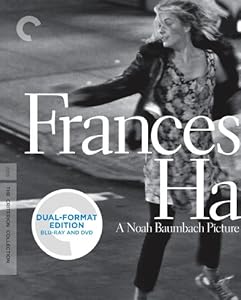
I know what you're thinking. "Do I really want to see another movie about young artists complaining about how hard it is to make a living in the greatest city in the world?" Cry me a river, Manhattanites. But in answer to your question, here's the funny thing: you do. as long as it's Frances Ha.
Indie queen Greta Gerwig stars in the title role of a twenty-seven-year-old dance-company "apprentice," meaning that, at work, she's a second-class citizen stuck understudying and hoping for opportunities that seem to be dwindling rather than growing. Her love life proves equally unfulfilling, with not unpleasant but unfulfilling boyfriends and dates that pass like subway trains. These cycles of disappointment make up most of this funny-sad movie, co-written by Gerwig and director Noah Baumbach (Margot at the Wedding, The Squid and the Whale).
But routine disappointments don't much deter the spirited Frances; what kills her is the loss of her roommate Sophie (Mickey Sumner), who, at film's outset, has a friendship with Frances so seemingly tight that it borders on unhealthy. "We are like a lesbian couple that doesn't have sex anymore," Frances notes. But Sophie, embracing her relationship with her boyfriend Patch (Patrick Heusinger), moves out, knocking Frances off her relatively even keel.
Frances begins flitting from apartment to apartment, including living for a time with two male roommates, Lev (Adam Driver of Girls—who's beginning to seem like the only living boy in New York) and Benji (Michael Zegen of Rescue Me), both of whom conjure romantic possibilities. Whether it's hometown Sacramento (the upper-middle-class suburbia to Frances' paycheck-to-paycheck urbia) or Paris (on a spur-of-the-moment vacation misfire), Frances can't seem to get comfortable in any one place.
Meanwhile, out of some combination of hope and pride, Frances turns down middling opportunities, keeping her eye on likely unattainable prizes. Maybe all she needs is one specific platonic ideal back in her life, in the form of Sophie. In its environment and exploration of work life, art life, romance, and friendship, it's a bit eerie how much Frances Ha resembles the first season of Girls, condensed to eighty-three minutes. And yet, if Gerwig's take is just as quirky and funny, it's decidedly warmer and less snarky.
The picture brims with funny ideas both verbal and visual that are finely tuned by Baumbach and his cast, and sharply edited by Jennifer Lame. By committing to a consistent style of dropping in and out of scenes to create comically decontextualized snippets of conversation, the filmmakers discover what feels like a fresh style of humor, creating magical moments of conversational nothing that out-Seinfeld Seinfeld (of smoking inside, for example, Frances says, "This makes me feel like a bad mother in 1987").
Baumbach makes numerous conscious audio-visual allusions to the French New Wave, but his black-and-white, Manhattan-set film (with a supporting turn by Grace Gummer, Meryl Streep's daughter) unavoidably conjures Woody Allen's Manhattan, another film that usefully explores the tension between romanticization and reality in New York City. (Though shot by Sam Levy, Frances Ha is dedicated to its visual consultant, the late, great Harris Savides.) Time to book another trip to the Big Apple.

|
|
 |
Criterion is now rolling out "Dual-Format Editions," or in other words "combo packs" that include both Blu-ray and DVD discs. Among the first titles to get this treatment is Frances Ha, one of the best films of 2013. Noah Baumbach's black-and-white picture looks quite nice in HD; though black-and-white digital photography doesn't yet look as ravishing as old-school film photography, this image offers plenty of detail, particularly when out of doors or in close-up. Though not perfectly consistent, the picture quality from the digital source is definitive in the title's home-video debut. The same can be said for the lossless DTS-HD Master Audio 5.1 mix, though this is not a film that makes much use of rear channels, other than to fill out the music; it's mostly a front-centered presentation of dialogue, which impresses with its clarity.
Two interviews offer imaginative pairings of top industry professionals and talent from Frances Ha. The first, "Noah Baumbach and Peter Bogdanovich" (15:21, HD), gets into Baumbach's sylistic approach to telling the story, as well as the themes he hoped to tease out. "Greta Gerwig and Sarah Polley" (17:00, HD) looks at Gerwig's writing and acting processes as vehicles to develop the title character.
"Interpreting Reality" (18:19, HD) finds director Noah Baumbach, director of photography Sam Levy, and film colorist Pascal Dangin discussing their approach to the black-and-white imagery, which was converted from color photography.
Rounding out the disc is the film's "Theatrical Trailer" (1:56, HD).
 |